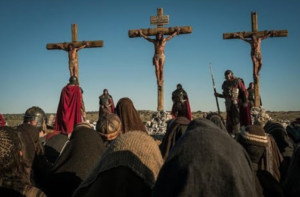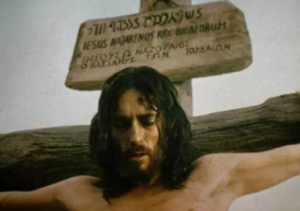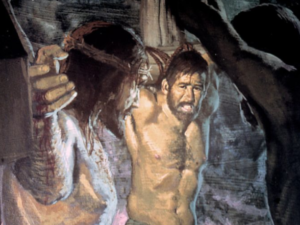The second of Christ’s cross utterances was spoken in response to the request of the dying thief.
 It was no accident that Christ was crucified between two thieves. There are no accidents in a world that is governed by God. God was presiding over this Day and Event which lies at the very centre of the World’s history. Since the beginning of time He had decreed when and where and how and with whom His Son would die. All that God had planned came to pass exactly as He had chosen. Whatever man did was simply that which God’s hand and counsel, “determine to be done”. (Acts 4:28)
It was no accident that Christ was crucified between two thieves. There are no accidents in a world that is governed by God. God was presiding over this Day and Event which lies at the very centre of the World’s history. Since the beginning of time He had decreed when and where and how and with whom His Son would die. All that God had planned came to pass exactly as He had chosen. Whatever man did was simply that which God’s hand and counsel, “determine to be done”. (Acts 4:28)
God had declared through Isaiah that His Son should be, “numbered with the transgresssors” (Isaiah 53:12). The Holy One of God would be numbered with the unholy. The Son of God to be executed with criminals seemed utterly inconceivable. Just as God had ordained, and just as He had announced, it came to pass. “Forever, O Lord, Thy word is settled in heaven” (Psalm 119:89)
God has good purpose for everything he does. All His works are ordered by infinite wisdom.
Was our blessed Lord crucified with the two thieves to:
- fully demonstrate the unfathomable depths of shame into which He had descended?
- show us the position He occupied as our substitute?
- exhibit man’s estimate of the peerless One – “despised” as well as rejected?
- to show a representation of the drama of Salvation and man’s response to. One sinner repenting and believing; and the other sinner reviling and rejecting?
 The two malefactors were crucified together. They were equally near to Christ. Both of them saw and heard all that transpired during those fateful six hours. Both were notoriously wicked; both were suffering acutely; both were dying, and both urgently needed forgiveness.
The two malefactors were crucified together. They were equally near to Christ. Both of them saw and heard all that transpired during those fateful six hours. Both were notoriously wicked; both were suffering acutely; both were dying, and both urgently needed forgiveness.
Yet, one of them died in his sins. He died as he lived, hardened and impenitent. While the other repented of his wickedness, believed in Christ, called on Him for mercy and went to Paradise.
We see precisely the same thing happening today. Under exactly the same circumstances and conditions one person is melted and another unmoved. When hearing the same sermon, one person will listen with indifference, while the other one will have his eyes opened to see his need and his will moved to accept God’s offer of mercy.
Why?
How can this be accounted for accept by the sovereignty of God! And yet God’s sovereignty is never meant to destroy human responsibility. Both are plainly taught in the Bible. As Christians it is our responsibility to believe and teach both whether we understand them or not.
The late C.H. Spurgeon, when preaching on 1 Timothy 2:3,4
“This is good and acceptable in the sight of God our Savior, who desires all men to be saved and to come to the knowledge of the truth.” 1 Timothy 2:3,4,
“There stands the text, and I believe that it is my Father’s wish that ‘all men should be saved, and come to the knowledge of the truth.’ But I know, also, that He does not will it, so that He will save any one of them, unless they believe in His Son; for He has told us over and over gain that He will not. He will not save any man except he forsakes his sins, and turns to Him with full purpose of heart: that I also know. And I know also, that He has a people whom He will save, whom by His eternal power He will deliver. I do not know how that squares with this, that is another of the things I do not know.”
We say again, God’s sovereignty is never meant to destroy man’s responsibility. We are commanded to preach the Gospel to “every creature.” Grace is free. The invitation is broad enough to take in, “whosoever believeth.” Christ turns away none who come to Him. Yet, after we have done all, after we have planted and watered, it is God who “giveth the increase,” and this He does as best pleaseth His sovereign will.
The salvation of the thief occurred at a time when it would appear that Christ had lost all power to save Himself or others. This thief had marched along with Savior through the streets of Jerusalem and had seen Him sink beneath the weight of the cross! His enemies were triumphing over Him. His friends has mostly forsaken Him. Public opinion was unanimously against Him.
From the very beginning Christ’s lowly condition was a stumbling block to the Jews. And now, the circumstances of His death must have intensified it. Even those who had believed on Him were now doubting. There was no one in the crowd who stood there and cried, “Behold the Lamb of God which taketh away the sin of the world!”
 How could this thief have such faith and such spiritual understanding to see Jesus as his Savior in this circumstance? This dying thief took a suffering, bleeding, crucified man for his God! It can only be Divine intervention that this man’s faith in Christ was a miracle of Grace.
How could this thief have such faith and such spiritual understanding to see Jesus as his Savior in this circumstance? This dying thief took a suffering, bleeding, crucified man for his God! It can only be Divine intervention that this man’s faith in Christ was a miracle of Grace.
He cried, “Lord remember me”. He knew that he could do nothing whatsoever to help himself. He knew his condition was so desperate this it was entirely beyond human repair. He recognized that he had no self-righteousness and deserved the penalty of the cross. He was a lost sinner and unfit for the presence of a holy God.
At his point of repentance he says to his companion, “Dost not though fear God, seeing thou art in the same condemnation?” (Luke 23:40) He was not saying, “Dost not thou fear punishment?” but, “Dost not thou fear God?” He recognizes God as Judge. He also adds, “And we indeed justly; for we receive the due reward of our deeds” (Luke 23:41).
Here we see him acknowledging his guilt and the justice of his condemnation. He passes a sentence upon himself. He makes no excuses and attempts no partial justification for his life and actions that got him to where he is today. He recognized that he was a transgressor and that he fully deserved the punishment for his sins.
The thief’s “repentance toward God” was accompanied with “faith toward our Lord Jesus Christ.”
Over the cross was the superscription, “This is Jesus the King of the Jews.” Pilate had placed it there in derision. But it was the truth nevertheless, and he had written it, God would not allow him to alter it. The board bearing this superscription had been carried in front of Christ through the streets of Jerusalem and out to the place of the crucifixion. The thief had read it, and Divine grace and power had opened the eyes of his understanding to see that it was the truth. His faith had grasped the Kingship of Christ, as we seen when he said, “when Thou comest into Thy Kingdom.”
Faith always rest on the written Word of God.
This thief was an outcast from society. Who would remember him? The public would think no more of him after this day. His friends would be glad to forget him. His family would be glad to never talk about him again – having disgraced his family. But there was one that he ventured to ask this petition, “Lord, remember me.”
Finally the thief demonstrated a “courageous faith”. Christ who hung on the central Cross was the One on whom all eyes were turned and toward whom all the vile mockery of a vulgar mob was directed. This crowd joined together in jeering the Savior. Matthew tells us that, “they had passed by reviled Him,” that “likewise also the chief priests mocked, with the elders and scribes.” Luke informs us, “the soldiers also mocked Him” (23:36). It is therefore easy to understand why the thieves should also take up the taunting cry.
 But, the repenting thief instead of continuing to sneer and jibe at Christ, turns to his companion and openly rebukes him in the hearing of the spectators gathered around the crosses, crying, “This Man hath done nothing amiss.” With these words he condemned the whole Jewish nation. He spoke up with great courage!
But, the repenting thief instead of continuing to sneer and jibe at Christ, turns to his companion and openly rebukes him in the hearing of the spectators gathered around the crosses, crying, “This Man hath done nothing amiss.” With these words he condemned the whole Jewish nation. He spoke up with great courage!
It Is Never Too Late
This account shows a man in just a few dying hours grow in grace and in the knowledge of his Lord. Under the power of the Holy Spirit he discovered:
- His belief in a future life where retribution would be meted out by a righteous and sin-avenging God. “Dost thou not fear God?”
- He had insight into his own sinfulness, “Thou art in the same condemnation. And we indeed justly; for we receive the due reward of our deeds” (Luke 23:40,41).
- He bore testimony to Christ’s sinlessness. “This Man hath done nothing amiss” (Luke 23:41)
- He not only witnessed to the sinless humanity of Christ but he also confessed His Godhead. “Lord, remember me,” he said.
- He believed in the Saviorhood of the Lord Jesus. He had heard Christ’s prayer for His enemies, “Father, forgive them,”. These words were a short sermon to an opened heart. His own cry, “Lord remember me” included within its scope, “Lord, save me,” which therefore implies his faith in the Lord Jesus as Savior.
- He evidenced his faith in Christ’s Kingship. “when Thou comest into They Kingdom.” Outward appearance meant nothing. Nevertheless, He was King – King of the Jews (Matthew 2:2)
- He looked forward to the Second Coming of Christ. “when thou comest.” He looked away from the present to the future.
 The Holy Spirit was his teacher. Flesh and blood had not revealed these things unto him but the Father in Heaven.
The Holy Spirit was his teacher. Flesh and blood had not revealed these things unto him but the Father in Heaven.
“And Jesus said unto him,
Verily I say unto these,
Today should thou be with me
in Paradise”
(Luke 23:42,43)
Divine grace always exceeds human expectation. “Today,” before that very day had passed he would be with the Savior. He would be delivered from all sorrow and suffering.
Have a GREAT day . . . someday it will be HISTORY!


Follow Us!